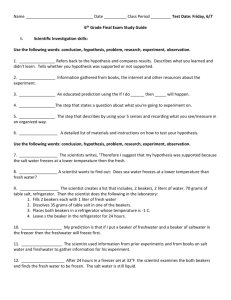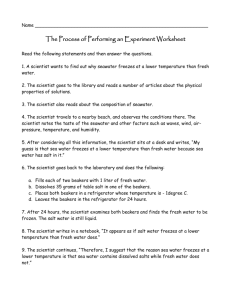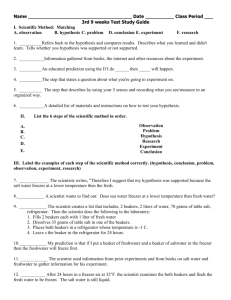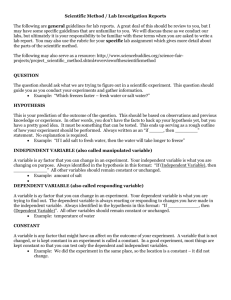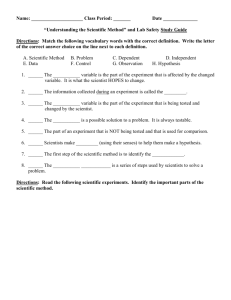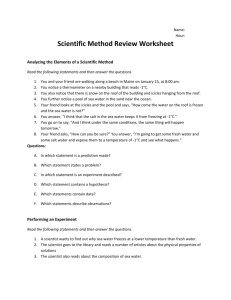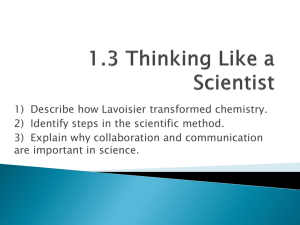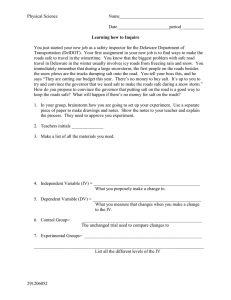Test Review scientific method 13 14
advertisement
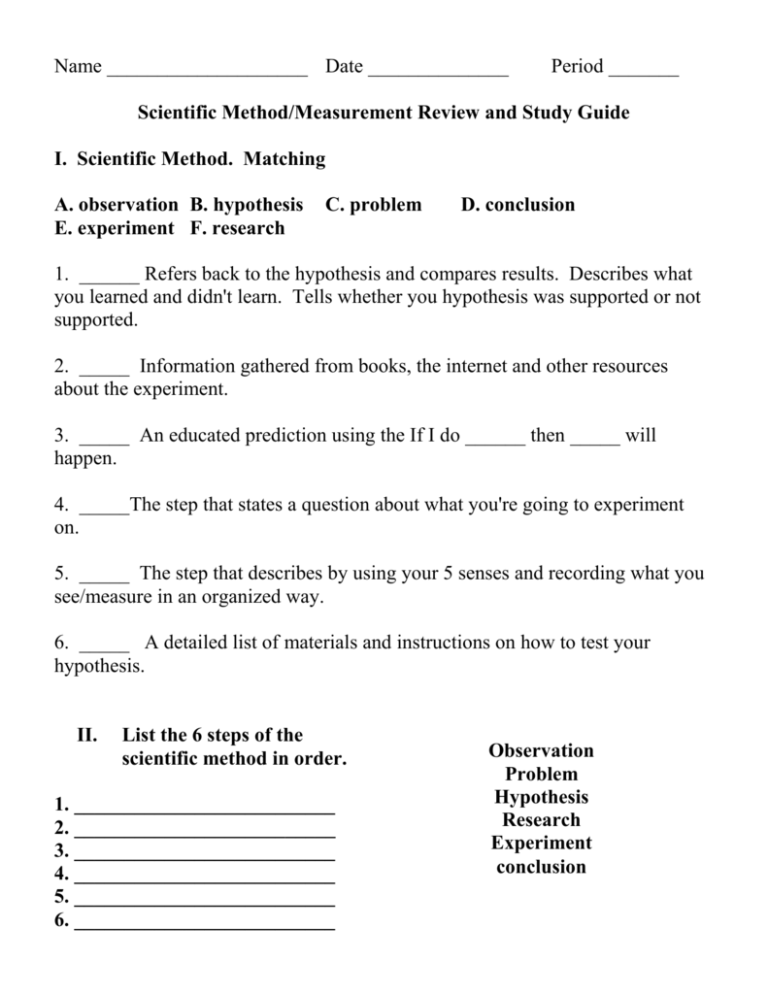
Name ____________________ Date ______________ Period _______ Scientific Method/Measurement Review and Study Guide I. Scientific Method. Matching A. observation B. hypothesis E. experiment F. research C. problem D. conclusion 1. ______ Refers back to the hypothesis and compares results. Describes what you learned and didn't learn. Tells whether you hypothesis was supported or not supported. 2. _____ Information gathered from books, the internet and other resources about the experiment. 3. _____ An educated prediction using the If I do ______ then _____ will happen. 4. _____The step that states a question about what you're going to experiment on. 5. _____ The step that describes by using your 5 senses and recording what you see/measure in an organized way. 6. _____ A detailed list of materials and instructions on how to test your hypothesis. II. List the 6 steps of the scientific method in order. 1. __________________________ 2. __________________________ 3. __________________________ 4. __________________________ 5. __________________________ 6. __________________________ Observation Problem Hypothesis Research Experiment conclusion III. Label the examples of each step of the scientific method correctly. (hypothesis, conclusion, problem, observation, experiment, research) 7. _________________ The scientists writes, "Therefore I suggest that my hypothesis was supported because the salt water freezes at a lower temperature then the fresh. 8. _________________ A scientist wants to find out: Does sea water freezes at a lower temperature than fresh water? 9. _________________ The scientist creates a list that includes, 2 beakers, 2 liters of water, 70 grams of table salt, refrigerator. Then the scientist does the following in the laboratory: 1. Fills 2 beakers each with 1 liter of fresh water 2. Dissolves 35 grams of table salt in one of the beakers. 3. Places both beakers in a refrigerator whose temperature is -1 C. 4. Leave s the beaker in the refrigerator for 24 hours. 10. __________________ My prediction is that if I put a beaker of freshwater and a beaker of saltwater in the freezer then the freshwater will freeze first. 11. __________________ The scientist used information from prior experiments and from books on salt water and freshwater to gather information for his experiment. 12. ___________________ After 24 hours in a freezer set at 32°F the scientist examines the both beakers and finds the fresh water to be frozen. The salt water is still liquid. IV. Experimental Design. Vocabulary Matching. Word Bank constant, variables, independent variable, dependent variable, repeated trials, control 13. ________________________________The standard for comparison in an experiment. 14. ________________________________ Things that can be changed in an experiment-any changes in an experiment. 15. ________________________________ The variable that is changed on purpose by you. 16. _________________________________ A term that means you have the same amount of water, same containers, etc. in an experiment -- things that stay the same during the experiment. 17. ________________________________ The variable the responds to the change in the experiment. You have no control over this variable. 18. ________________________________ The number of times to experiment is done over again. V. Observation, Inference, and Classification Write an observation and an inference for the picture below. 19. Observation: 20. Inference: VI. Measurement review: Complete the chart: Definition: 21. Length Units measured in: Instrument(s) Used: 22. 23. Mass 24. 25. 26. Volume 27. 28. 29. Label each example below with the correct measurements. 30. _____________ 31.______________ 32. _____________ 33. _____________ 34.______________ 33. 34. 35. 36. VI. Variables Read each statement & identify the independent and dependent variable. 37. Michael put 100 red seeds, 100 brown seeds, and 100 yellow seeds in his bird feeder. He counted the number of seeds of each color that remained after 2 days. Independent ___________________________ Dependent ____________________________ 38. Leticia timed how fast apple slices turned brown after being dipped in different liquids such as lemon juice, fruit freshener, and lime soda. The apples slices turned brown the quickest when placed in lime soda. Independent __________________________ Dependent ___________________________
